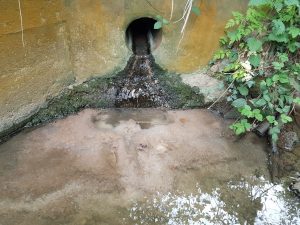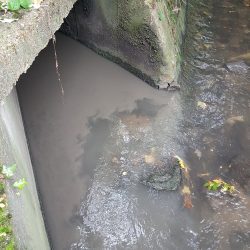Do you see pollution in the Beverley Brook and want to do something about it? Did you know that misconnected household plumbing is sending sewage water straight into our precious waterways?
Rivers should be healthy spaces for wildlife and places people can enjoy, but they are plagued by pollution – some of it coming straight from our homes.
This spring, you can become a citizen scientist and help us identify, map and assess polluted outfalls along the river, which rises in Cuddington Park, Stoneleigh, and passes through New Malden, Wimbledon Common and Richmond Park. This is all in partnership with Zoological Society of London (ZSL) for the latest round of their Outfall Safari programme.

Solving the problem of misconnections
Our drainage network is serviced by two systems. One collects rainwater and flows directly into rivers. The other takes foul wastewater from buildings to sewage treatment works to be cleaned first.
When appliances such as washing machines, sinks or toilets are incorrectly connected into the rainwater drainage system, this pollution spills directly into rivers. Signs of these plumbing misconnections can be as obvious as detergents or waste from toilets appearing in the water. These misconnections can become a chronic source of pollution with serious impacts on water quality and wildlife.
In 2016, ZSL created a method to survey London’s rivers to identify and report polluting drains. Before then, the scale of the issue was completely unknown. Now the method is used nationwide.
The results from volunteer surveys are reported via an App to the Environment Agency and Thames Water. The water company then addresses the misconnected plumbing with property owners or local councils.
What difference has it made?

Outfall Safaris on the Beverley Brook were last conducted in 2019. Then, 57 out of 196 drains (29%) were found to be spilling pollution into the nine miles of river which includes the East Pyl and Pyl Brook tributaries.
Emma Broadbent, Volunteer and Engagement Officer at the South East Rivers Trust, said: “We’re excited to be focusing on the Beverley Brook, because last time our volunteers surveyed the river they found a high number of polluting outfalls. We are eager to find out what the situation is now, five years on.
“We know from the work on other rivers that Outfall Safaris really work. Last year, we surveyed the Wandle, finding just nine polluting outfalls from 135 drains, compared to 2019 when we found 16 that were polluting the river. Signing up to take part is a valuable way for any river lover to make a difference.”
During training, participants will gain an overview of water quality issues in the catchment, learn how outfalls become polluted and will be given full instructions on how to assess them and report them via bankside surveys. There is no need to enter the water.
How do you get involved?
Training takes place on Wednesday 20th March from 1.30pm to 3.30pm at Worcester Park Library, Stone Place, Windsor Road, Worcester Park, KT4 8ES. Sign up here.
Participants must be aged 18 or over, attend the training in person and be able to commit to carrying out the Outfall Safaris in March and April. Specifically, you will need to be able to conduct surveys during dry periods, at least 48 hours after wet weather. This is to ensure any pollution is not masked or diluted by rainwater drainage.
Across London and the South East of England, Thames Water, ZSL and local volunteers have prevented 4,243 misconnected appliances from polluting watercourses: 23% of them were washing machines and 21% kitchen sinks.
If you have further questions email Sam Facey, ZSL’s training co-ordinator.
